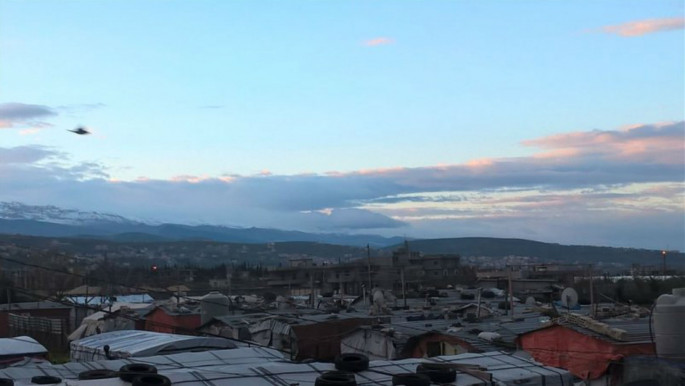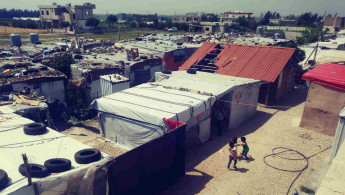Return to Syria? Refugees draft grassroots proposal
"Do you want to get down?" asks the driver. There is a military checkpoint ahead. The man replies: "Is it army or police?"
"Army."
We wait a moment. "OK, let's try," says the man in the back. After a quick glance at the front seats, the young soldier waves us through.
The man in the back closes his eyes, praising God under his breath. Abu Mohammed turns on the radio as if to shake off the memory of previous arrests, days spent standing in dark rooms with hands tied to the ceiling. We continue in silence along the road, the ever-present layer of smog hanging heavy above us. For unregistered Syrian refugees living in Lebanon, the threat of arrest is ever present.
But arrest is only one of their worries. Lack of employment, substandard living conditions and local hostility are all issues with which refugees must contend. Despite 1.5 million refugees living in Lebanon, no official refugee camps for Syrians have even been permitted. Lebanese authorities tolerate settlements with no more than 30 families. More, and the army dismantles them.
 |
|
|
Makeshift Syrian settlements are tolerated by Lebanese officials, as long as they are home to fewer than 30 families [Roshan De Stone/David Suber] |
Abu Mohammed drops us at a school built in the middle of Akkar's strawberry fields. We are here to meet the Syrians who drafted a peace proposal for the establishment of safe return zones. Considering the recent escalation of violence in Syria, we were intrigued by such a proposal originating from the informal camps of Akkar.
The proposal was drafted back in 2015, when the Lebanese government ordered UNHCR to stop registering refugees. Abu Mohammed, one of the proposal's spokespersons, has been working on diffusing its contents among Syrian communities in Lebanon and abroad.
"I don't blame the Lebanese government when they say that the situation here has reached its limit," he says.
In Lebanon, 87 percent of Syrian refugees live in the poorest districts in the northern regions of Akkar and the Bekaa, where local unemployment and lack of services were worrying even before the crisis started. Seven years since the first arrivals of refugees, socio-economic tensions with local communities have increased as Syrian workers are forced into extortionately cheap labour, creating competition locals can hardly sustain.
Since 2015, new legislation made it harder for Syrians to renew their papers, exposing refugees to arbitrary arrests and detention. Recent data shows that 75 percent of Syrian refugees in Lebanon are unregistered, leading to an increase in irregular employment, lack of adequate housing, abuse and exploitation.
 |
| The undocumented status of refugees has given rise to a boom in the 'informal' labour sector, with children working in the fields [Roshan De Stone/David Suber] |
Halfway through 2017, UNHCR reported an increase in spontaneous returns to Syria, a phenomenon linked both to the scaling down of violence in certain regions, and to the deterioration of living conditions in host countries.
Caught between the growing hardships of displacement and premature conditions for return, Syrians in Lebanon have to walk the fine line between advocating for safe and dignified return while being careful not to fuel excuses for coerced refoulement. The peace proposal written by Syrians in Akkar is one such effort.
Abu Mohammed was a school teacher in Homs before leaving Syria in 2012, when children stopped coming to class for fear of shelling. With the help of some local organisations and the support of the municipality, he opened a school for Syrian refugees in Akkar.
"My work in the school goes hand in hand with the peace proposal," he said. "It's crucial we help ourselves over here, but this cannot be a long-term plan... we want to return to Syria as soon as chances permit."
 |
Unlike de-escalation zones, these safe neutral zones would be placed under the protection of unarmed humanitarian actors, to host returning refugees as well as internally displaced people. |  |
The proposal advocates for the establishment of safe demilitarised zones in Syria, based on Articles 14 and 15 of the fourth Geneva Convention for the Protection for Civilian Persons, setting the conditions for the establishment of neutral zones in areas of warfare.
Unlike de-escalation zones, these safe neutral zones would be placed under the protection of unarmed humanitarian actors, to host returning refugees as well as internally displaced people.
One such zone has already been identified south of Homs, between the towns of Qusayr and Yabroud, stretching between the Lebanese border and the Homs-Damascus highway. This area was the first place in which Hizballah militias intervened in 2013, and is currently controlled by Syrian government forces. Home to more than 20 percent of Syrian refugees in Lebanon, this region has been chosen for its proximity to the Lebanese border and its agricultural resources.
As with nearly any area in the country, the establishment of a safe return zone with international protection could only come through a compromise with the authorities in Damascus and its allies, hence requiring substantive diplomatic efforts.
Supported by the Italian nonviolent peace corps Operation Dove, which has international experience in promoting safe zones in places of protracted violence, the proposal has already been discussed with the EU vice-president and the EU High Commissioner for Foreign Affairs, while a delegation is furthering talks with individual European governments.
Critics of the proposal point out that Europe's lack of engagement with the Syrian conflict might not make it the best place to look for support. Despite statements of solidarity from the EU, practical support for the proposal is limited. EU members appear more keen to invest in Lebanon's anti-terrorism and security apparatus, eager to promote Lebanon's stability and prevent a spillover of refugees onto their doorstep.
But Abu Mohammed is aware of the necessity of finding a political platform. "Why is it normal for those who destroyed Syria to be the ones deciding about its future? Our aim is to bring voices of Syrian refugees at the negotiating table. The proposal provides a blueprint of what refugees see as the fundamental conditions for return.
"Gathering international support is the only margin of action we are allowed by the current situation. But we want to set the groundwork for the day refugees will return to Syria."
Wary of publicly promoting returns under the current situation, international organisations have long ago started negotiating the ground rules for the establishment of return zones inside Syria. Few of them however, are leaving any space for Syrian refugees to part take in these discussions.
"Refugees are treated as if their only role is to run away from war, becoming powerless victims begging for help."
Abu Mohammed walks us out of the camp's school, facing the strawberry fields separating Lebanon's mountains from the Syrian border. "Our lives have been in-between Syria and Lebanon way before the war started. If you think about it, who's better placed than us to indicate the way for return?"
Roshan De Stone is a human rights advocate working in Syrian refugee camps in Lebanon. She is a full-time contributor to Brush&Bow.
David L. Suber is a political researcher and journalist. He is directing a documentary on deportations from Europe and currently lives in Lebanon, where he works in refugee camps. David is a full-time contributor to Brush&Bow.


![President Pezeshkian has denounced Israel's attacks on Lebanon [Getty]](/sites/default/files/styles/image_684x385/public/2173482924.jpeg?h=a5f2f23a&itok=q3evVtko)



 Follow the Middle East's top stories in English at The New Arab on Google News
Follow the Middle East's top stories in English at The New Arab on Google News


